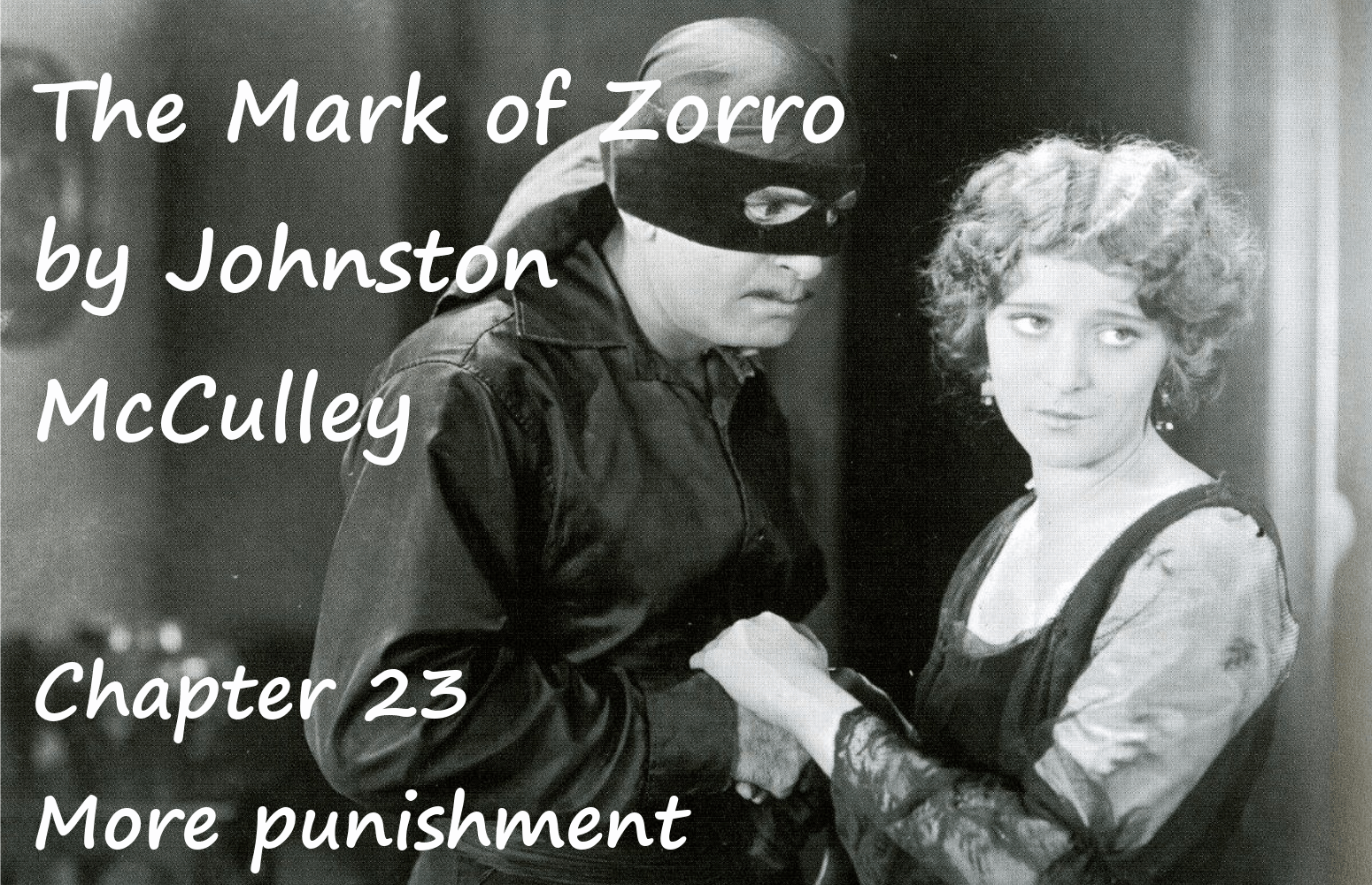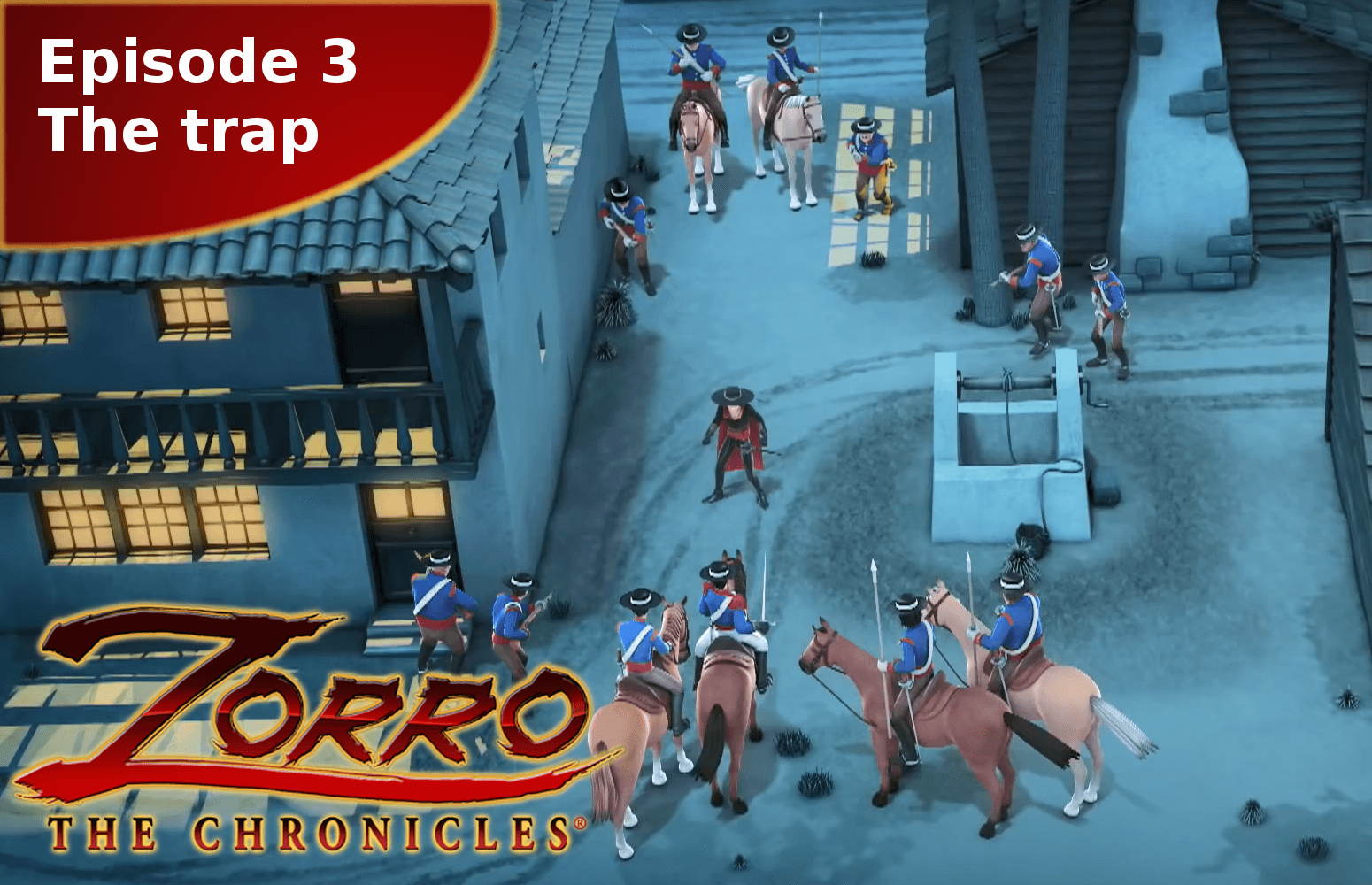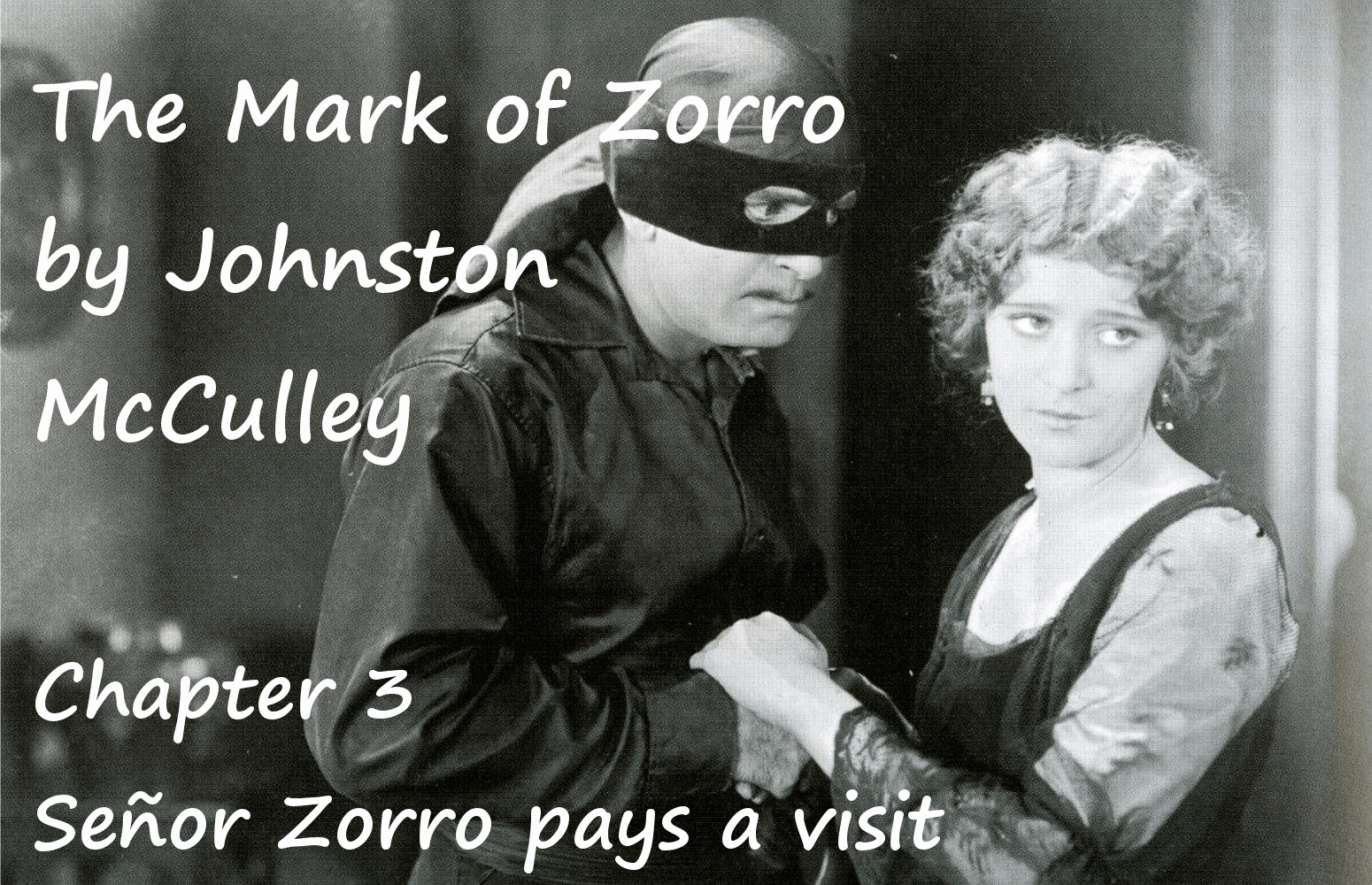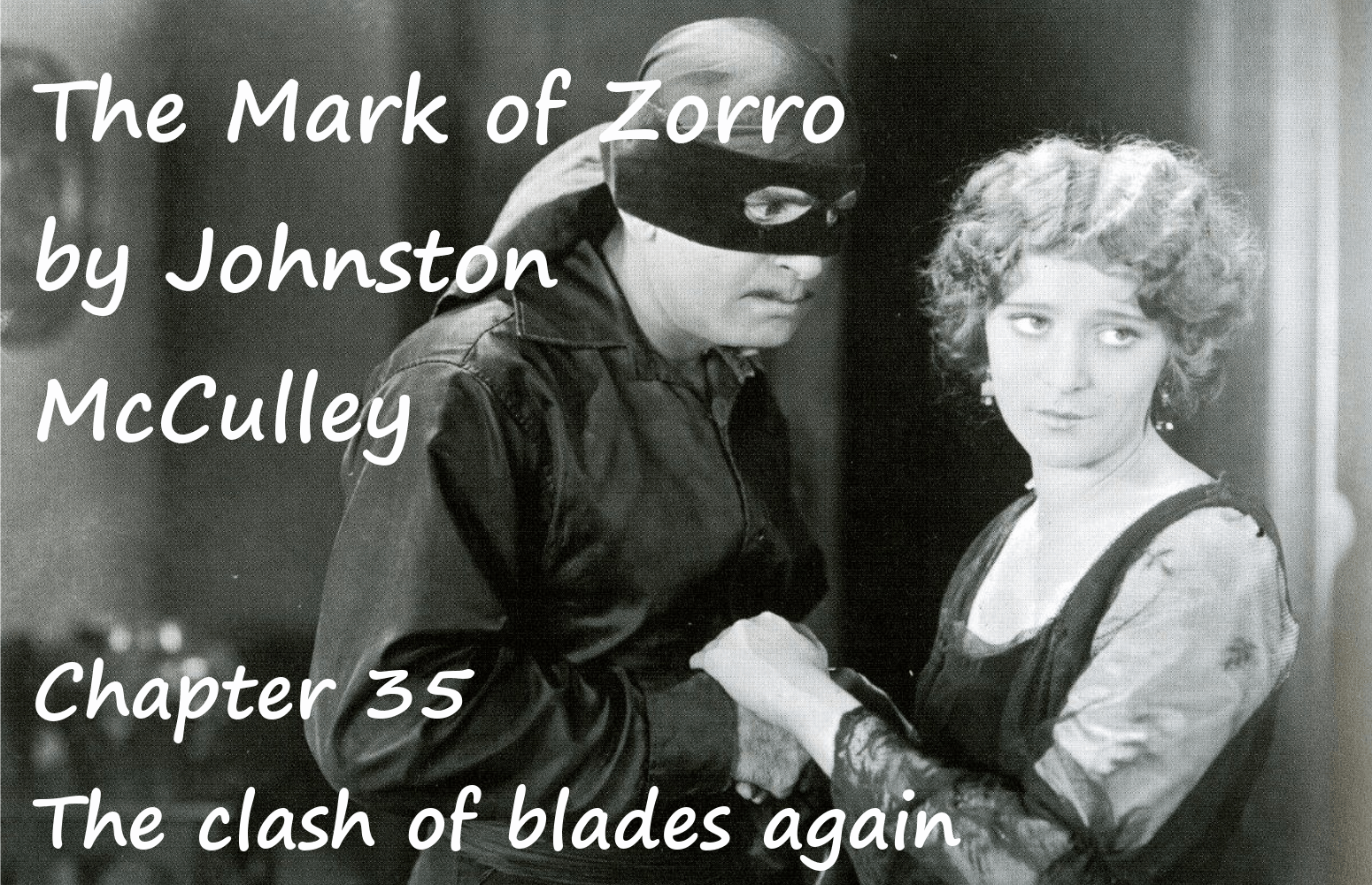The Mark of Zorro chapter 23 More punishment
The Mark of Zorro chapter 23 More punishment
Author McCulley, Johnston, 1883-1958
Title The Mark of Zorro
Note Published serially under the title: The curse of Capistrano.
Language English
Copyright Status Public domain in the USA.
Señor Zorro rode quickly to the crest of the hill beneath which was the pueblo, and there he stopped his horse and looked down at the village.
It was almost dark, but he could see quite well enough for his purpose. Candles had been lighted in the tavern; and from the building came the sounds of raucous song and loud jest. Candles were burning at the presidio and from some of the houses came the odor of cooking food.
Señor Zorro rode on down the hill. When he reached the edge of the plaza he put spurs to his horse, and dashed up to the tavern door, before which half a dozen men were congregated, the most of them under the influence of wine.
“Landlord!” he cried.
None of the men about the door gave him particular attention at first, thinking he was but some caballero on a journey wishing refreshment. The landlord hurried out, rubbing his fat hands together, and stepped close to the horse. And then he saw that the rider was masked, and that the muzzle of a pistol was threatening him.
“Is the magistrado within?” Señor Zorro asked.
“Si, Señor!”
“Stand where you are and pass the word for him. Say there is a caballero here who wishes speech with him regarding a certain matter.”
The terrified landlord shrieked for the magistrado, and the word was passed inside. Presently the judge came staggering out, crying in a loud voice to know who had summoned him from his pleasant entertainment.
He staggered up to the horse, and put one hand against it, and looked up to find two glittering eyes regarding him through a mask. He opened his mouth to shriek, but Señor Zorro warned him in time.
“Not a sound, or you die!” he said. “I have come to punish you. To-day you passed judgment on a godly man who was innocent. Moreover, you knew of his innocence, and his trial was but a farce. By your order he received a certain number of lashes. You shall have the same payment.”
“You dare—”
“Silence!” the highwayman commanded. “You about the door there—come to my side!” he called.
They crowded forward, the most of them peons who thought that here was a caballero who wished something done and had gold to pay for it. In the dusk they did not see the mask and pistol until they stood beside the horse, and it was too late to retreat then.
“We are going to punish this unjust magistrado,” Señor Zorro told them. “The five of you will seize him now, and conduct him to the post in the middle of the plaza, and there you will tie him. The first man to falter receives a slug of lead from my pistol, and my blade will deal with the others. And I wish speed, also.”
The frightened magistrado began to screech now.
“Laugh loudly, that his cries may not be heard,” the highwayman ordered; and the men laughed as loudly as they could, albeit there was a peculiar quality to their laughter.
They seized the magistrado by the arms and conducted him to the post, and bound him there with thongs.
“You will line up,” Señor Zorro told them. “You will take this whip, and each of you will lash this man five times. I shall be watching, and if I see the whip fall lightly once I shall deal out punishment. Begin!”
He tossed the whip to the first man, and the punishment began. Señor Zorro had no fault to find with the manner in which it was given, for there was great fear in the hearts of the peons, and they whipped with strength, and willingly.
“You, also, landlord!” Señor Zorro said.
“He will put me in carcel for it afterward,” the landlord wailed.
“Do you prefer carcel or a coffin, señor?” the highwayman asked.
It became evident that the landlord preferred the carcel. He picked up the whip, and he surpassed the peons in the strength of his blows.
The magistrado was hanging heavily from the thongs now. Unconsciousness had come to him with about the fifteenth blow, more through fear than through pain and punishment.
“Unfasten the man,” the highwayman ordered.
Two men sprang forward to do his bidding.
“Carry him to his house,” Señor Zorro went on. “And tell the people of the pueblo that this is the manner in which Señor Zorro punishes those who oppress the poor and helpless, who give unjust verdicts and who steal in the name of the law. Go your ways!”
The magistrado was carried away, groaning, consciousness returning to him now. Señor Zorro turned once more to the landlord.
“We shall return to the tavern,” he said. “You will go inside and fetch me a mug of wine, and stand beside my horse while I drink it. It would be only a waste of breath for me to say what will happen to you if you attempt treachery on the way.”
But there was fear of the magistrado in the landlord’s heart as great as his fear of Señor Zorro. He went back to the tavern beside the highwayman’s horse, and he hurried inside, as if to get the wine. But he sounded the alarm.
“Señor Zorro is without,” he hissed at those nearest the table. “He has just caused the magistrado to be whipped cruelly. He has sent me to get him a mug of wine.”
Then he went on to the wine cask and began drawing the drink slowly as possible.
There was sudden activity inside the tavern. Some half-dozen caballeros were there, men who followed in the footsteps of the governor. Now they drew their blades and began creeping toward the door, and one of them who possessed a pistol and had it in his sash, drew it out, saw that it was prepared for work, and followed in their wake.
Señor Zorro, sitting his horse some twenty feet from the door of the tavern, suddenly beheld a throng rush out at him, saw the light flash from half a dozen blades, heard the report of a pistol, and heard a ball whistle past his head.
The landlord was standing in the doorway, praying that the highwayman would be captured, for then he would be given some credit, and perhaps the magistrado would not punish him for having used the lash.
Señor Zorro caused his horse to rear high in the air, and then raked the beast with the spurs. The animal sprang forward, into the midst of the caballeros, scattering them.
That was what Señor Zorro wanted. His blade already was out of its scabbard, and it passed through a man’s sword-arm, swung over and drew blood on another.
He fenced like a maniac, maneuvering his horse to keep his antagonists separated, so that only one could get at him at a time. Now the air was filled with shrieks and cries, and men came tumbling from the houses to ascertain the cause of the commotion. Señor Zorro knew that some of them would have pistols, and while he feared no blade, he realized that a man could stand some distance away and cut him down with a pistol-ball.
So he caused his horse to plunge forward again, and, before the fat landlord realized it, Señor Zorro was beside him, and had reached down and grasped him by the arm. The horse darted away, the fat landlord dragging, shrieking for rescue and begging for mercy in the same breath. Señor Zorro rode with him to the whipping-post.
“Hand me that whip!” he commanded.
The shrieking landlord obeyed, and called upon the saints to protect him. And then Señor Zorro turned him loose, and curled the whip around his fat middle, and as the landlord tried to run he cut at him again and again. He left him once to charge down upon those who had blades and so scatter them, and then he was back with the landlord again, applying the whip.
“You tried treachery!” he cried. “Dog of a thief! You would send men about my ears, eh? I’ll strip your tough hide—”
“Mercy!” the landlord shrieked, and fell to the ground.
Señor Zorro cut at him again, bringing forth a yell more than blood. He wheeled his horse and darted at the nearest of his foes. Another pistol-ball whistled past his head, another man sprang at him with blade ready. Señor Zorro ran the man neatly through the shoulder and put spurs to his horse again. He galloped as far as the whipping-post, and there he stopped his horse and faced them for an instant.
“There are not enough of you to make a fight interesting, señores,” he cried.
He swept off his sombrero and bowed to them in nice mockery, and then he wheeled his horse again and dashed away.



